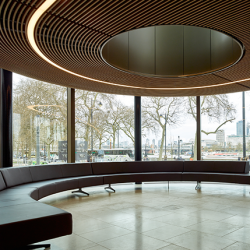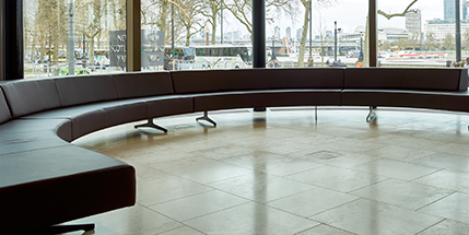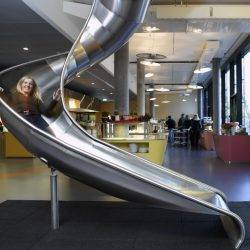October 12, 2017
New Scotland Yard wins Better Public Building Award at the 2017 British Construction Industry Awards
 The New Scotland Yard building on Victoria Embankment has been named as the winner of the 2017 Prime Minister’s Better Public Building Award. The Award sets out to ‘recognise excellence in publicly funded buildings and infrastructure, and highlights projects that bring real change to communities, demonstrate innovative and efficient construction and deliver value for money’. The winning building, designed by AHMM, is a £58 million project that remodelled and extended the former Curtis Green building. It represents a move back to Victoria Embankment for the Metropolitan Police service, having first previously occupied the address in 1890. The new entrance is designed ‘to create a welcoming and non-institutional yet secure front door’ and reinstates the iconic revolving sign. The project was completed as part of a major rethink of the organisation’s corporate real estate strategy, in line with UK Government objectives for the public sector estate.
The New Scotland Yard building on Victoria Embankment has been named as the winner of the 2017 Prime Minister’s Better Public Building Award. The Award sets out to ‘recognise excellence in publicly funded buildings and infrastructure, and highlights projects that bring real change to communities, demonstrate innovative and efficient construction and deliver value for money’. The winning building, designed by AHMM, is a £58 million project that remodelled and extended the former Curtis Green building. It represents a move back to Victoria Embankment for the Metropolitan Police service, having first previously occupied the address in 1890. The new entrance is designed ‘to create a welcoming and non-institutional yet secure front door’ and reinstates the iconic revolving sign. The project was completed as part of a major rethink of the organisation’s corporate real estate strategy, in line with UK Government objectives for the public sector estate.
























 The majority (94 percent) of workers are open to flexible ways of working such as part-time, freelance, contract, temporary or independent contract work a new report from ManpowerGroup has revealed. Coining the trend as NextGen work, the research suggests this approach to a job is a choice (81 percent) not a last resort (19 percent). Findings from #GigResponsibly: The Rise of NextGen Work – a global survey of 9,500 people in 12 countries – identifies a shift towards this new way of getting work done, and that it works for people and employers. People were asked how they want to work, what motivates them and their views on NextGen Work. More control over their schedule (42 percent), boosting their bank account (41 percent) and developing new skills (38 percent) are top reasons why this flexible kind of work is on the rise. The report also found that this flexible approach is not just attractive to Millennials, as meaningful work and employer appreciation are valued more by Boomers than any other generation. More than 80 percent of US workers say NextGen Work is a choice, not a last resort, and builds resilience for less predictable futures.
The majority (94 percent) of workers are open to flexible ways of working such as part-time, freelance, contract, temporary or independent contract work a new report from ManpowerGroup has revealed. Coining the trend as NextGen work, the research suggests this approach to a job is a choice (81 percent) not a last resort (19 percent). Findings from #GigResponsibly: The Rise of NextGen Work – a global survey of 9,500 people in 12 countries – identifies a shift towards this new way of getting work done, and that it works for people and employers. People were asked how they want to work, what motivates them and their views on NextGen Work. More control over their schedule (42 percent), boosting their bank account (41 percent) and developing new skills (38 percent) are top reasons why this flexible kind of work is on the rise. The report also found that this flexible approach is not just attractive to Millennials, as meaningful work and employer appreciation are valued more by Boomers than any other generation. More than 80 percent of US workers say NextGen Work is a choice, not a last resort, and builds resilience for less predictable futures.











October 10, 2017
We (still) need to talk about mental health in the workplace
by Liam Butler • Comment, Wellbeing
More →